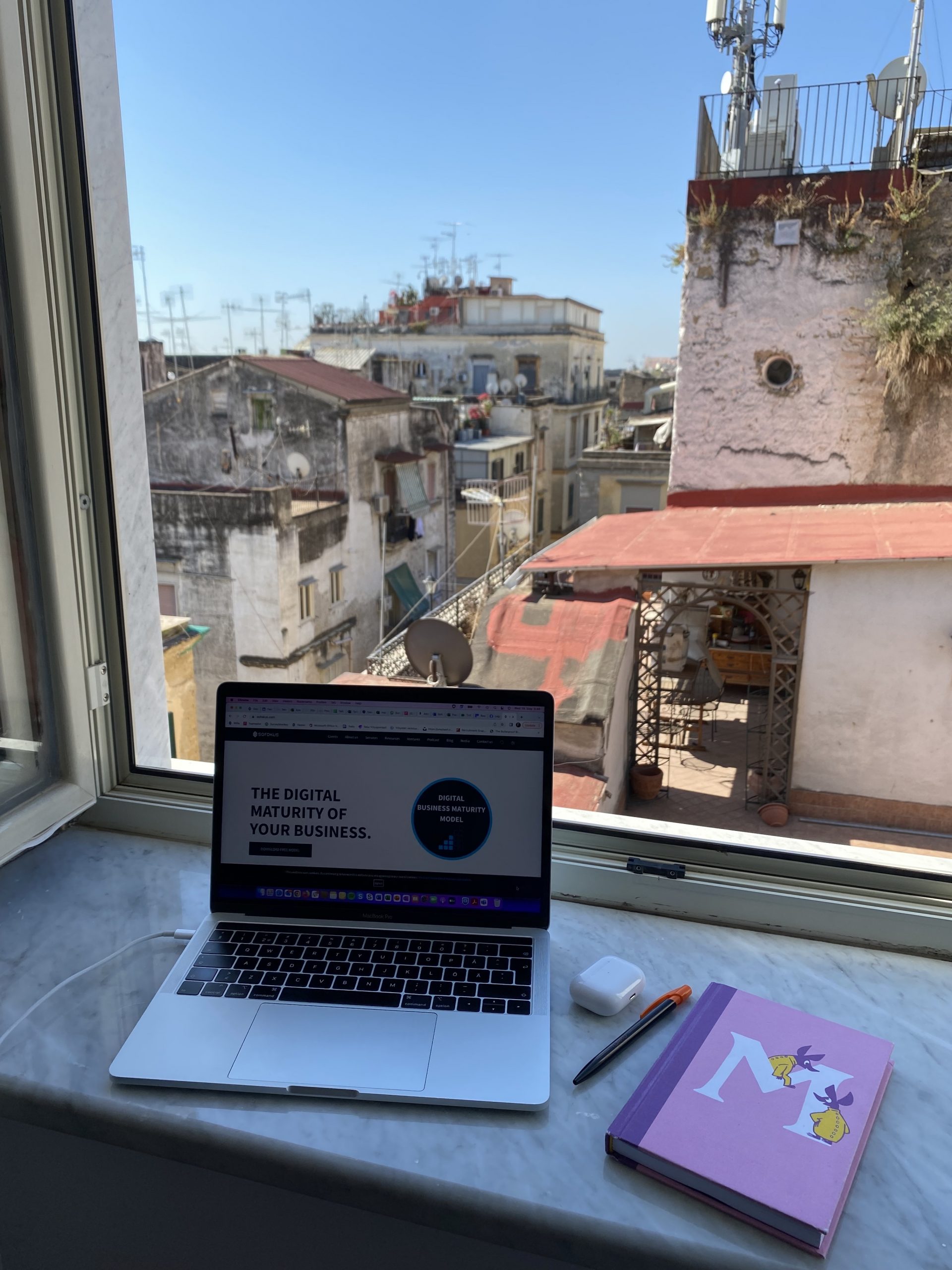
8 tips for remote work abroad
25 Aug 2022
Our Chief Happiness Officer, Milla Heikkilä, had a taste of remote work abroad – and it was certainly great in the land of pasta, pizza, and gelato. Milla gathered eight tips to help you get the most out of working remotely.

In May, I spent a week working in a lovely loft in Naples. Every morning I opened the door to our balcony and looked at Mount Vesuvius standing in the background, and couldn’t help but sigh in admiration. I got to wake up to the smell of Italian coffee and the sounds of “Buongiorno!” echoing from the street, and I was over the moon to be back in the heart of a big city after more than two years of not travelling.
Of course, I’ve done remote work abroad before, but this time the trip was planned purely for the purpose of remote work.
Although we have a great new office, Sofokus also allows you to work completely remotely if you wish. Furthermore, the location of remote working is not limited to Finland, but our employees can choose to work from any EU country, within certain constraints.
This time, my choice landed me under the Italian sun. As I had prepared in advance for working remotely abroad, the work itself went quite smoothly. Of course, a few mistakes were made (for example, we didn’t realise that the airport is not necessarily the best place for meetings or that Italian coffee is much stronger than Finnish coffee), so I thought I’d share eight tips for those who are tempted to remote work abroad.
1. Check your employer’s attitude towards remote working and your company’s teleworking policy
The first thing to do is to find out what your employer’s policy is on remote working abroad. What are your employer’s instructions on the subject? For example, does your workplace have any restrictions on the time or destination abroad?
Check your employer’s attitude towards remote working and your company’s teleworking policy
The first thing to do is to find out what your employer’s policy is on remote working abroad. What are your employer’s instructions on the subject? For example, does your workplace have any restrictions on the time or destination abroad?
2. Work out your budget
What kind of budget do you have available? Will you have enough money to pay for two apartments for the duration of your stay abroad? There are also differences between destinations and accommodation. For example, Airbnb allows you to rent an apartment with a kitchen where you can easily prepare your own meals, but you can also dine at a nearby restaurant if your budget allows. Similarly, Paris is a much more expensive remote working destination than, say, Budapest. An obvious point, but one that you might not immediately think about. And what other wishes do you have for your remote work abroad period?
3. Remote work abroad requires you to take time differences into account
Within Europe, the time difference with Finland is quite tolerable, and problems are less likely to arise. If working under the palm trees of Thailand is your dream, you should consider whether you are prepared to adjust your daily schedule in order to be available to your colleagues.
4. Make sure you have a working WIFI connection
Make sure that the internet connection in both the destination country and the accommodation is as good as possible. There’s nothing more frustrating than an ever-lagging Teams call. Few jobs these days can be done without a decent WIFI, so it’s a good idea to double-check.

5. Be particularly careful about data security
Go through your remote working plan with your employer, and also make sure that you have prepared for the possible security issues. Many companies have recently tightened up their security policies, and that’s a good thing. Make sure your anti-virus software is up to date and that you are familiar with your employer’s security guidelines (e.g. VPN, screen protectors, etc.).
6. Check your tax and social security details
If you’re working abroad for longer periods, make sure you’re covered for tax and social security. If you are abroad for more than a few weeks at a time, your employer will have to apply for a so-called A1 certificate to maintain your Finnish social security. You should also find out about tax so that, in the worst case, you don’t have to pay two sets of taxes retrospectively.
7. Ask about insurance and other benefits
Who takes care of your travel insurance? You or your employer? What about other employment benefits and occupational health services? In many cases, the employee will have to cover any additional costs (such as medical fees), so you should talk to your employer before booking your trip.
8. Be mindful when booking flights
A return flight in the evening will only work if you have access to a decent working space on the day of departure. The check-out is often around noon, which means you’ll have to find a working space for the rest of the day. Sometimes this may work, sometimes it may not. Personally, I recommend flying either at the weekend or very early in the morning to avoid this problem.

I’m the kind of person who needs a change of scenery from time to time. I need the chance to go far away to see up close and let my inspiration blossom again. That’ s why I am incredibly grateful that Sofokus makes this possible. I could well imagine working abroad for longer periods, but so far I’ve been happy with 1-2 week periods.
My next trip is likely to be to Croatia. If you want to keep up to date with what’s happening on the trip and what remote work abroad looks like from Split, sign up for the Better Monday Newsletter and follow Sofokus’ Instagram account.
Shortcuts
- 1. Check your employer's attitude towards remote working and your company's teleworking policy
- 2. Work out your budget
- 3. Remote work abroad requires you to take time differences into account
- 4. Make sure you have a working WIFI connection
- 5. Be particularly careful about data security
- 6. Check your tax and social security details
- 7. Ask about insurance and other benefits
- 8. Be mindful when booking flights




